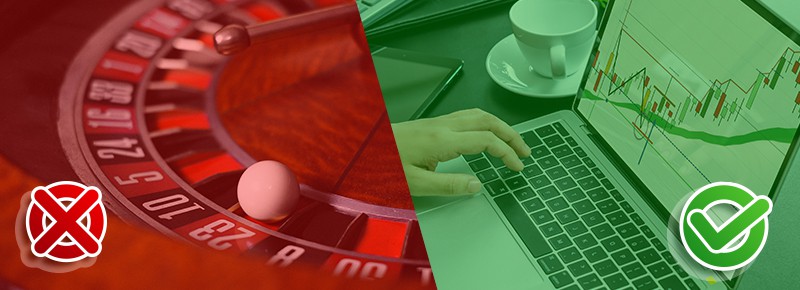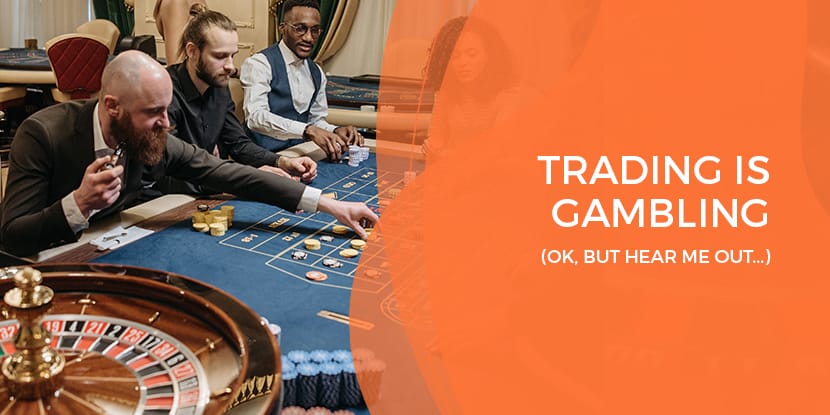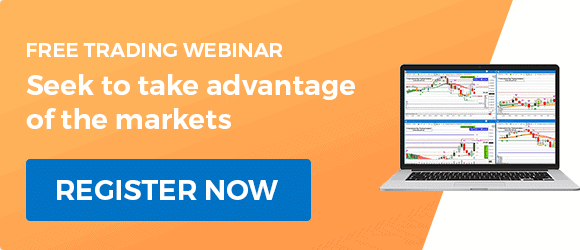Trading is gambling… you hear that quite a bit. It’s more common to hear this from non-traders and those who don’t know much about trading. In this article I’ll explain to you why I actually think that they’re right.
Pretty controversial coming from someone who teaches people how to trade, right? Bear with me…
I want to explain to you the ways in which I think trading is like gambling. I’ll show you who has the edge when it comes to the gamble, and what that edge is.
Is Trading The Same As Gambling?
Is trading the same as gambling? Like I said, I think that it is (in a way).
Before I go on, I’ll describe what I believe to be a reasonable definition of gambling.
To me, gambling is placing money on an outcome that you don’t have control over. I don’t know any traders that have control over what the markets do, and I assume you don’t either. So we can safely say that trading fits my description.
I want to expand on this idea now and dive a little deeper into trading and gambling.
Trading and Gambling
We’ve established that trading is like gambling in that you risk money on an outcome outside of your control. Moving forward I want to explain why I think that trading and gambling are similar using a casino as an example.
No doubt gambling at the casino is a risky business for the patron. There is another side to every bet within any casino, the house. You might already see where I’m going with this…
The difference between the average gambler and the house is, the house has the odds in its favour. This is why casinos are profitable businesses. They of course do lose, and the gambler does indeed win sometimes, but the house always comes out on top, long-term.
Is there a way to trade with the odds in your favour the same way that a casino does, and look to come out on top in the long-term?
Day Trading vs Gambling
We can now say you can be either a gambler, or you can be the house. How does this extend to trading?
To trade like the house rather than the gambler, you need to find an edge. There needs to be a system where we can achieve a higher probability for our desired outcome. In trading we actually call this the trader’s edge.
As a trader you build or adapt a strategy based on past events that indicate a more probable outcome. Of course there is no guarantee that you’ll be right each time. But, the probability that you will be right is in your favour. This means that without always be right, your chance of being profitable over a period of time is better.
Probability doesn’t work every time, but it works over time.
So like the house, you have better odds, you should be profitable. There are never guarantees for profitability in trading, but you now have an edge.
Now if you’re a trader that trades like a gambler, you’re someone who doesn’t have the trader’s edge. You don’t have a strategy (or you’re not following it). You don’t have probability in your favour. Even if you considered the odds exactly equal (50/50), you won’t break-even. This is because of the commissions you pay to place a trade.
Trading Without Gambling
Trading without gambling isn’t 100% possible, but we can decrease the level of that gamble.
The trading strategy I mentioned is able to predict more probable outcomes. It can do this based on decades of data about price movement. What you’ll find in trading is that price often moves in similar trading patterns. When you identify a pattern, it suggests that price will either go up or down. Now again, this doesn’t happen EVERY time, but more often than not.
There’s another thing to consider here too, and I’ve not touched on it yet. When you go to the casino and place a bet, and you lose that bet, you lose 100% of your bet size. This doesn’t have to be the case when you’re trading (unless you trade Binary Options, but let’s not go there…).
As a trader you have a special tool that a gambler doesn’t have. You have the ability to control your risk inside of a trade, and you can also exit a trade at any time (in most cases). This is what I mean when I say you don’t need to lose 100% of your funds used for the trade.
As a trader, I already know where I want to exit if it looks like I will lose the trade. I actually set this point on my trading platform when I make the trade. I’m referring to a stop loss which will remove me from the trade when price reaches that point. This happens automatically and my trading platform does it for me.
My trading strategy identifies a failure point based on patterns, and trading indicators. The failure point will indicate that I was wrong and my trade will most likely not be profitable
Because I have this stop loss, I have control on the biggest loss that I will take. What this allows me to do is seek to make my losses small. If I can keep losses small, and try to achieve larger gains, I can tip the odds even further in my favour. The larger the size of the profits vs losses, the less often I need to be correct. I still want to try to be correct around 60% of the time as a benchmark. If my losses are larger than my wins then I need to have a much higher win rate which can be difficult.
The balance is now in your favour. By predicting outcomes based on a more probable event, and limiting the amount of risk in each trade. Saying this, you need to understand the importance of learning a trading strategy. Possibly even more important, you need to understand risk management for traders.

Trading is Gambling, But I’m OK With That
So trading is like gambling, I don’t mind. I don’t mind because when I trade, I trade like the house. I have day trading strategies that help me make decisions. I base those decisions on higher probabilities.
I can’t control the market, I’ll have losing trades. But with my strategy, I increase my chances of being profitable long-term. And with my risk management techniques I can try to keep my risk and losses lower. At the end of the day, that’s what we do as traders.
So I’ll have profitable times as a trader and be very happy. I’ll also have times when I’m not profitable, which I accept. The only time I can be disappointed in an outcome is if I didn’t trade like the house. If I don’t follow my strategy, and I don’t manage my risk, then I have traded like a gambler.
I hope by now you can see that, yeah, trading is risky, just like gambling, but those that are successful over a long period of time, tend to have a trader’s edge. Good luck, and I hope you find your trading edge.
If you’re interested in learning to trade as a means of wealth creation you can join us for our next free trading class




